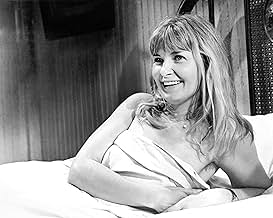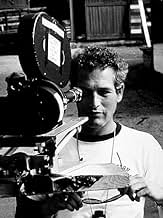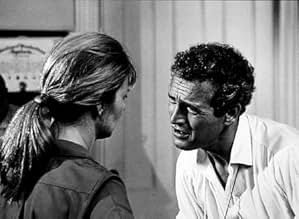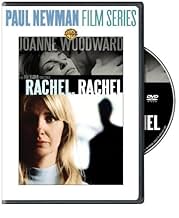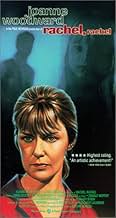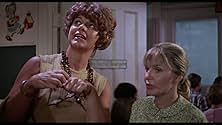CALIFICACIÓN DE IMDb
7.1/10
4.1 k
TU CALIFICACIÓN
Agrega una trama en tu idiomaRachel is a lonely school teacher who lives with her mother. When a man from the big city asks her out, she starts thinking about where she wants her life to go.Rachel is a lonely school teacher who lives with her mother. When a man from the big city asks her out, she starts thinking about where she wants her life to go.Rachel is a lonely school teacher who lives with her mother. When a man from the big city asks her out, she starts thinking about where she wants her life to go.
- Nominado a 4 premios Óscar
- 7 premios ganados y 11 nominaciones en total
Dortha Duckworth
- Mae
- (as Dorothea Duckworth)
- Dirección
- Guionistas
- Todo el elenco y el equipo
- Producción, taquilla y más en IMDbPro
Argumento
¿Sabías que…?
- TriviaNell Potts, who plays Rachel as a young girl, is actually Joanne Woodward and Paul Newman's daughter.
- ErroresRachel's hair pattern changes in two continuous shots on the hospital bed. The front camera angle shows her hair in front of her ears, but the side camera shows her hair behind her ears.
- Citas
Nurse: The operation was a success. You're out of danger.
Rachel Cameron: How can I be out of danger if I'm not dead?
- Versiones alternativasJoanne Woodward's character's name, Rachel, is changed to Jennifer for the Italian version in order to make it sound more American.
- ConexionesFeatured in Queersighted: The Gay Best Friend (2023)
Opinión destacada
"Rachel, Rachel" received a lot of praise and recognition upon it's release in 1968. This was primarily due to the then powerhouse couple "du-jour", Paul Newman and Joanne Woodward. He directed, she starred in this character study of a 35 year old second grade school teacher (Woodward) who realizes at the beginning of the summer season that she's middle aged and, in her words, it's all downhill into the grave from here.
We've seen this kind of character study before, most notably in David Lean's splendid "Summertime" with Katherine Hepburn. Like Woodward's character here in "Rachel, Rachel", Hepburns character was middle aged (more far along that Woodward's character is to boot), a school teacher and a spinster (read: virgin) looking, maybe, JUST maybe to find love at last. The two heroines do find love in men who are amorous and good looking but alas, not available. But while Hepburn's affair was pure romance and the mood was one of sheer beauty and joy, Woodward's character experiences it as yet another painful event in a life spent too cautiously. Her Rachel is controlled and allows herself to be controlled by others, especially her shrill, domineering and demanding Mother.
What most likely made "Rachel, Rachel" seem extraordinary back in 1968 was the "frank" and "adult" themes and the composition of some of the shots. For example, the film has a full on lesbian kissing scene. It's a nicely done bit of business that must've seen way out in the late 60's when progressive film making was just making inroads in American film making. In addition, the film has what for the times must've been fairly explicit sex scenes between Woodward and James Olsen. Nothing beyond a bare back is shown but the raciness must've seemed very daring. By today's standards, "Rachel, Rachel" would barely warrant a very tepid PG-13 rating.
One gets the feeling after watching "Rachel, Rachel" that the creators felt that the character of Rachel was compelling in and of itself. It's not. The fact that she's inhabited by Ms. Woodward does make the character a lot more interesting and believable than the material warrants. Woodward is superb here. You immediately understand her character and she gets our sympathies with little or no effort. The problem is that she's such a pleasant and pretty woman that it's difficult to understand why she's so lonely or has allowed herself to withdraw so completely.
As for the rest of the small cast, Estelle Parsons plays her only friend and fellow school teacher who might be hiding more than she's letting on. She's fine but in that peculiar and "unique" Parsons way that can be both irritating (as she was at times in "Bonnie & Clyde) and endearing at times as she is here. James Olson is perfectly fine as Nick Kazlik, Rachel's first lover. He's comes across both sexually charged and adventurous. You have no problem believing that Rachel would be held spellbound by his attentions and heartbroken when she learns his true intentions. Her Mother is played by Kate Harrington who is so shrill and one dimensional that you cannot understand why Rachel would put up with her. And there's baffling turn at the very end when Rachel finally confronts the Mother to say she's going to move away to Oregon and she asks the Mother to come along with her. It's a strange and inconsistent development because up until this point, we've been made to feel that it's the Mother who has held Rachel back and it would be best to get AWAY from her.
Donald Moffat plays Rachel's undertaker father, only in flashbacks. These scenes are of little consequence because they tell us next to nothing about how their relationship possibly effected Rachel in any way. They're like extra flourishes that serve no purpose at all.
There are so many elements that are left unexplained and unexamined in "Rachel, Rachel" that despite the nice camera-work and cinematography, the film feels incomplete. Does Rachel have a fascination with death because she lived with it for so long? And if so, how is this effecting her outlook on life? Who was in the photograph that Nick showed her? Was it his son? Why did Estelle Parson's character seek God in the church? Was she feeling guilty about her sexuality? And as mentioned above, why did Rachel choose to take the Mother with her to Oregon? Was it only the small town that held her back? "Rachel, Rachel" is nicely directed by Paul Newman in an unobtrusive style. He doesn't go into any big camera effects. The problems with he film lie in the basic storyline and the sketchy characterizations. It must've seemed very modern, adult and cutting edge upon it's release. But seen nearly 40 years later, it feels very quaint, slender and inconsequential despite the fine performance of Joanne Woodward.
We've seen this kind of character study before, most notably in David Lean's splendid "Summertime" with Katherine Hepburn. Like Woodward's character here in "Rachel, Rachel", Hepburns character was middle aged (more far along that Woodward's character is to boot), a school teacher and a spinster (read: virgin) looking, maybe, JUST maybe to find love at last. The two heroines do find love in men who are amorous and good looking but alas, not available. But while Hepburn's affair was pure romance and the mood was one of sheer beauty and joy, Woodward's character experiences it as yet another painful event in a life spent too cautiously. Her Rachel is controlled and allows herself to be controlled by others, especially her shrill, domineering and demanding Mother.
What most likely made "Rachel, Rachel" seem extraordinary back in 1968 was the "frank" and "adult" themes and the composition of some of the shots. For example, the film has a full on lesbian kissing scene. It's a nicely done bit of business that must've seen way out in the late 60's when progressive film making was just making inroads in American film making. In addition, the film has what for the times must've been fairly explicit sex scenes between Woodward and James Olsen. Nothing beyond a bare back is shown but the raciness must've seemed very daring. By today's standards, "Rachel, Rachel" would barely warrant a very tepid PG-13 rating.
One gets the feeling after watching "Rachel, Rachel" that the creators felt that the character of Rachel was compelling in and of itself. It's not. The fact that she's inhabited by Ms. Woodward does make the character a lot more interesting and believable than the material warrants. Woodward is superb here. You immediately understand her character and she gets our sympathies with little or no effort. The problem is that she's such a pleasant and pretty woman that it's difficult to understand why she's so lonely or has allowed herself to withdraw so completely.
As for the rest of the small cast, Estelle Parsons plays her only friend and fellow school teacher who might be hiding more than she's letting on. She's fine but in that peculiar and "unique" Parsons way that can be both irritating (as she was at times in "Bonnie & Clyde) and endearing at times as she is here. James Olson is perfectly fine as Nick Kazlik, Rachel's first lover. He's comes across both sexually charged and adventurous. You have no problem believing that Rachel would be held spellbound by his attentions and heartbroken when she learns his true intentions. Her Mother is played by Kate Harrington who is so shrill and one dimensional that you cannot understand why Rachel would put up with her. And there's baffling turn at the very end when Rachel finally confronts the Mother to say she's going to move away to Oregon and she asks the Mother to come along with her. It's a strange and inconsistent development because up until this point, we've been made to feel that it's the Mother who has held Rachel back and it would be best to get AWAY from her.
Donald Moffat plays Rachel's undertaker father, only in flashbacks. These scenes are of little consequence because they tell us next to nothing about how their relationship possibly effected Rachel in any way. They're like extra flourishes that serve no purpose at all.
There are so many elements that are left unexplained and unexamined in "Rachel, Rachel" that despite the nice camera-work and cinematography, the film feels incomplete. Does Rachel have a fascination with death because she lived with it for so long? And if so, how is this effecting her outlook on life? Who was in the photograph that Nick showed her? Was it his son? Why did Estelle Parson's character seek God in the church? Was she feeling guilty about her sexuality? And as mentioned above, why did Rachel choose to take the Mother with her to Oregon? Was it only the small town that held her back? "Rachel, Rachel" is nicely directed by Paul Newman in an unobtrusive style. He doesn't go into any big camera effects. The problems with he film lie in the basic storyline and the sketchy characterizations. It must've seemed very modern, adult and cutting edge upon it's release. But seen nearly 40 years later, it feels very quaint, slender and inconsequential despite the fine performance of Joanne Woodward.
- chconnol
- 10 abr 2005
- Enlace permanente
Selecciones populares
Inicia sesión para calificar y agrega a la lista de videos para obtener recomendaciones personalizadas
- How long is Rachel, Rachel?Con tecnología de Alexa
Detalles
Taquilla
- Presupuesto
- USD 700,000 (estimado)
- Total a nivel mundial
- USD 589
Contribuir a esta página
Sugiere una edición o agrega el contenido que falta

Principales brechas de datos
By what name was Raquel, Raquel (1968) officially released in India in English?
Responda

